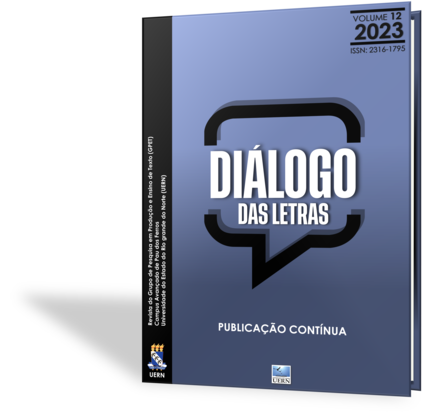A description of the pragmatic function of mas and aí in Brazilian Portuguese: analysis on the functional equivalents of German Modal Particles
DOI:
https://doi.org/10.22297/2316-17952023v12e02304Keywords:
Modal Particles, Modality in Portuguese, Contrastive analysis of functional equivalentsAbstract
In this article, we introduce an investigation on the description of the modal function of mas and aí in Brazilian Portuguese. Using a cross-linguistic approach, we propose a shared pragmatic function of these items with German Modal Particles - MPs - (aber and doch), consisting in the discourse grammatical function of anchoring the utterance in an assumed dialogic setting (DIEWALD et al. 2017). Examples of an authentic corpus in Portuguese (from responses to an online questionnaire) were analyzed first within the 3-format semantic scheme (DIEWALD; FISCHER, 1998) and, secondly, within the Descriptive Format scheme (DIEWALD et al. 2017). Therefore, this proposal is original and unprecedented, since, in addition to analyzing, from a functional perspective, the particles of Brazilian Portuguese, it proposes, with a translinguistic approach, a pragmatic function of such items, so that they can be seen as equivalent to the German MPs. The results indicate that it is possible to describe a pragmatic function and formal characteristics of Modal Particles in Portuguese, emphasizing the importance of such description for the adequacy of the grammatical classification of modal elements in languages other than German, as well as a contribution for the learning and teaching of these linguistic phenomena in a plurilingual setting.
Downloads
References
AQUINO, M. The teaching of German modal particles: didactic strategies in GFL. Revista Brasileira de Linguística Aplicada, Belo Horizonte, v. 20, n. 1, p. 131-161, 2020.
AQUINO, M. Das sieht ja ganz anders aus, wie fühlst du dich denn? Teaching Modal Particles ja and denn with the Queer Eye Germany series: a didactic model based on a Descriptive Format. Pandaemonium Germanicum, São Paulo, v. 26, n. 49, p. 170-195, 2023.
AQUINO, M. Die Modalpartikel und ihre funktionalen Äquivalente im Portugiesischen. Jahrbuchs für internationale Germanistik, Berna, no prelo.
AQUINO, M.; ARANTES, P. C. C. Partículas modais em alemão e seus equivalentes funcionais em português brasileiro: proposta de análise e classificação para o uso. Pandaemonium Germanicum, São Paulo, v. 23, n. 40, p. 166-190, 2020.
AQUINO, M.; CINTO, A. L.; KAHIL, T. “Mas quem ia carregar uma nota fiscal?”: Uma investigação da função modal de “mas” em língua portuguesa. Revista Confluência, Rio de Janeiro, v. 2, n. 60, p. 373-399, 2021.
BRÜNJES, L. Das Paradigma deutscher Modalpartikeln: Dialoggrammatische Funktion und paradigmeninterne Opposition. Berlin: de Gruyter, 2014.
DIEWALD, G. Abtönungspartikel. In: HOFFMANN, L. (org.). Handbuch der deutschen Wortarten. Berlin/New York: De Gruyter. 2007. p. 117-141.
DIEWALD, G. Same but different: modal particles, discourse markers and the art (and purpose) of categorization. In: DEGAND, L.; PIETRANDREA, P.; CORNILLIE, B. (org.). Discourse markers and modal particles: categorization and description. Amsterdam: John Benjamins. 2013. p. 19-46.
DIEWALD, G.; FISCHER, K. Zur diskursiven und modalen Funktion der Partikeln aber, auch, doch und ja in Instruktions dialogen. Linguistica, Ljubljana, v. 38, n. 1, p. 75-99, 1998.
DIEWALD, G.; KRESIĆ, M. Ein übereinzelsprachlich kontrastives Beschreibungsmodell für Partikelbedeutungen. Linguistic Online, Bern, v. 44, n.4, p. 1-15, 2010.
DIEWALD, G.; KRESIĆ, M.; BATINIĆ, M. A. A format for the description of German modal particles and their functional equivalents in Croatian and English. In: CHIARA, Fedriani; SANSÓ, Andrea (Ed.). Pragmatic Markers, Discourse Markers and Modal Particles: New Perspectives. Amsterdam: John Benjamins, 2017. p. 230-254.
FISCHER, K.; HEIDE, M. Inferential processes in English and the question whether English has modal particles. Open Linguistics, Berlin, v. 4, n. 1, p. 509-535, 2018.
FRANCO, A. Descrição linguística das partículas modais no português e no alemão. Coimbra: Coimbra Editora, 1991.
HELBIG, G. Lexikon deutscher Partikeln. Leipzig: Enzyklopädie, 1988.
HENTSCHEL, E.; WEYDT, H. Handbuch der Deutschen Grammatik. Berlin: De Gruyter, 2013.
JOHNEN, T. Aí como partícula modal do português. In: CONGRESSO INTERNACIONAL DA ASSOCIAÇÃO BRASILEIRA DE LINGÜÍSTICA, 2., 1997, Salvador. Atas do 1o Congresso Internacional da Associação Brasileira de Lingüística. Bahia: Universidade Federal da Bahia, 1997. p. 1-5.
KRESIĆ, M.; BATINIĆ, M. A. Modalpartikeln: Deutsch im Vergleich mit dem Kroatischen und Englischen/Modalne čestice: njemački jezik u usporedbi s hrvatskim i engleskim. Zadar: Sveučilište u Zadru, 2014.
SCHOONJANS, S. Modalpartikeln als multimodale Konstruktionen: Eine korpusbasierte Kookkurrenzanalyse von Modalpartikeln und Gestik im Deutschen. Berlin: De Gruyter, 2018.
SPERBER, D.; WILSON, D. Teoria da relevância. Linguagem em (Dis)curso, v. 5, n. 1, p. 221-268, 2005.
WALTEREIT, R. Modal particles and their functional equivalents: a speech-act-theoretic approach. Journal of Pragmatics, v. 33, n. 9, p. 1391-1417, 2001.
WEYDT, H. Abtönungspartikel und andere Disponible. In: HARDEN, T; HENTSCHEL, E. (org.). 40 Jahre Partikelforschung. Tübingen: Stauffenburg. 2010. p. 11-32.
Downloads
Published
How to Cite
Issue
Section
License
Copyright (c) 2023 Diálogo das Letras

This work is licensed under a Creative Commons Attribution 4.0 International License.
A Diálogo das Letras não se responsabiliza por conceitos e opiniões emitidos pelos autores, tampouco manifesta, necessariamente, concordância com posições assumidas nos textos publicados. Além disso, os dados e a exatidão das referências citadas no trabalho são de inteira responsabilidade do(s) autor(es). Ao submeterem seus trabalhos, os autores concordam que os direitos autorais referentes a cada texto estão sendo cedidos para a revista Diálogo das Letras; ainda concordam que assumem as responsabilidades legais relativas às informações emitidas.
























